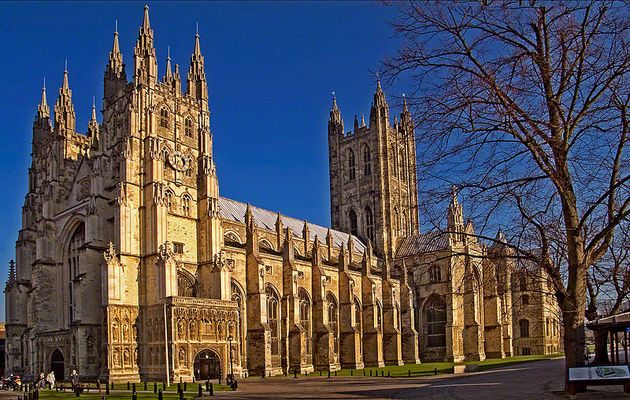The number of Britons who identify as Church of England has halved in fifteen years. Only 2% of those aged 18-24 identify with it.
 The Canterbury cathedral. / Wikimedia Commons.
The Canterbury cathedral. / Wikimedia Commons.
According to the new edition of the British Social Attitudes survey, the proportion of Britons who describe themselves as ‘belonging to the Church of England’ has halved in the last fifteen years.
Church of England affiliation is at a record low among all age groups, falling from 31% in 2002, to 14% in 2017.
The National Centre for Social Research's (NatCen) survey shows that the sharpest decline happened among 45 to 54-year-olds (35% in 2002 compared with 11% in 2017).
Among those aged 18-24, just 2% describe themselves as belonging to the Church of England, while those aged 65 and over are most likely to say they belong to it (30%), although they have declined too (51% in 2002).
CATHOLICS, OTHER CHRISTIANS AND NO RELIGION
The proportion of people who describe themselves as Roman Catholic (8%), belonging to “other Christian affiliations” (10%) and “of non-Christian faiths” (8%) have remained fairly stable.
Among those of “other Christian affiliations”, the majority identified themselves as evangelical Christians.
The majority of respondents (52%) now say they have no religion at all, compared with 41% in 2002. The least religious age group are those under 25 (70%), although the percentage of the over-65s who said they had no religion has risen from 18% to 34%.
CHURCH ATTENDANCE
The findings also highlight a significant gap between religious affiliations when it comes to church attendance, with 21% of respondents who affiliate themselves with the Church of England say they attend church, apart from special occasions, such as weddings and funerals, at least once a month.
Meanwhile, Roman Catholics go to church more regularly, with 42% attending at least once a month.
“AN UNRELENTING DECLINE”
“Our figures show an unrelenting decline in Church of England and Church of Scotland numbers”, Roger Harding, Head of Public Attitudes at the National Centre for Social Research, said.
Harding believed that “this is especially true for young people where less than 1 in 20 now belong to their established church. While the figures are starkest among younger people, in every age group the biggest single group are those identifying with no religion”.
“We know from the British Social Attitudes survey that people’s views are becoming more socially liberal on issues like same sex relationships and abortion [...] faith leaders will no doubt be considering how to better connect to a changing society”, he added.
CHURCH OF ENGLAND: “THE CHURCH EXISTS TO SHARE THE GOOD NEWS”
Dave Male, the Church of England's director of Evangelism and Discipleship, pointed out that “our experience is that people of all ages haven’t stopped searching for meaning and answers in their life”.
“It has been clear for some time that we have moved from an era of people automatically, and perhaps unthinkingly, classifying themselves as Church of England or Anglican to one in which identifying with a faith is an active choice” he said.
But, “ultimately the Church exists to share the good news of Jesus Christ. That was never meant to be easy and that work goes on whatever the figures may say”, Male concluded.
THE CHURCH OF SCOTLAND
The number of Scots who say they belong to the Church of Scotland has fallen overall, from 31% in 2002 to 18% in 2017.
These figures have gone hand in hand with a gradual decline in church attendance at Church of Scotland services: 33% of those affiliated with the Church attended at least once a month in 2002, while now only 25% do.
Additionally, 56% of Scots now say they have no religion. Those aged 18 to 34 are the most likely to say this (73%), but all age groups have seen a decline in religious identity of between 11-17% in the last fifteen years.
Responding to the figures, a Church of Scotland spokesperson told The Herald newspaper that they “endeavour to be a Christian presence in communities and a force for good and we will continue to focus on that”.
“Irrespective of the Church's popularity, that calling remains the same and is why today you still find Christians active at all levels of society. Whether we are many or we are few, the church will always seek to be that force for good in society”, he added.
DAVID ROBERSTON: “THE CHURCH OF SCOTLAND IS NO LONGER A CHURCH”
However, former Moderator of the Free Church of Scotland, David Robertson, warned that the Church of Scotland risked 'disaster' if it continues on its path of liberalisation, after voting earlier this year to allow ministers to conduct same-sex marriage ceremonies.
“More of the same methods will results in more of the same results. Going along with the tide means that they will continue to be swept away by it”, he wrote on his blog, The Wee Flea.
According to Robertson: “The Church of Scotland has largely become a social work organisation which just reflects the values of our culture. The bottom line is that it is failing because it is no longer the Church”.

Las opiniones vertidas por nuestros colaboradores se realizan a nivel personal, pudiendo coincidir o no con la postura de la dirección de Protestante Digital.
Si quieres comentar o